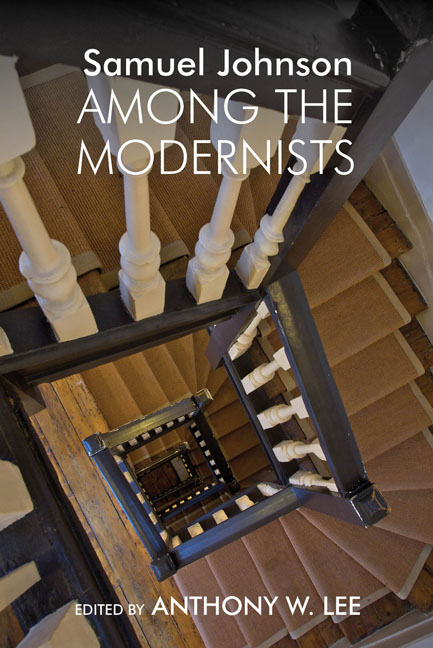Book contents
- Frontmatter
- Contents
- Acknowledgments
- Short Titles
- Abbreviations
- Introduction: Modernity Johnson?
- 1 Johnson, T. S. Eliot, and the City
- 2 “Saint Samuel of Fleet Street”: Johnson and Woolf
- 3 “Intellectually ‘Fuori del Mondo‘”: Pound's Johnson
- 4 The Antinomies of Progress: Johnson, Conrad, Joyce
- 5 Johnson Goes to War
- 6 Samuel Beckett and Samuel Johnson: Like-minded Masters of Life's Limitations
- 7 The “Plexed Artistry” of Nabokov and Johnson
- 8 Johnson and Borges: Some Reflections
- 9 Ernest Borneman's Tomorrow Is Now (1959): Thoughts about a Lost Novel, with Glances toward Samuel Johnson and other Modernists
- Notes
- Contributors
- Index
3 - “Intellectually ‘Fuori del Mondo‘”: Pound's Johnson
- Frontmatter
- Contents
- Acknowledgments
- Short Titles
- Abbreviations
- Introduction: Modernity Johnson?
- 1 Johnson, T. S. Eliot, and the City
- 2 “Saint Samuel of Fleet Street”: Johnson and Woolf
- 3 “Intellectually ‘Fuori del Mondo‘”: Pound's Johnson
- 4 The Antinomies of Progress: Johnson, Conrad, Joyce
- 5 Johnson Goes to War
- 6 Samuel Beckett and Samuel Johnson: Like-minded Masters of Life's Limitations
- 7 The “Plexed Artistry” of Nabokov and Johnson
- 8 Johnson and Borges: Some Reflections
- 9 Ernest Borneman's Tomorrow Is Now (1959): Thoughts about a Lost Novel, with Glances toward Samuel Johnson and other Modernists
- Notes
- Contributors
- Index
Summary
Introduction
At a 1984 meeting of Johnsonians, David Perkins argued for the importance of Johnson and his peers to the Modernist poets, especially T. S. Eliot. “Praise of the Augustans in Modernist criticism,” he contended, “is ordinarily combined with an attack on Romanticism. The Augustan mode is presented as a possible deliverance from error, yet a deliverance that only the strong-minded can receive.” In Perkins's model, the Augustan poets offer the Modernists an alternative approach to poetry not centered in the emotional life of the speaker, as associated with Romantics poetics. Instead it is a more cerebral and intellectually demanding method, as one finds in Pope or Johnson. Perkins shows how Pound helped Eliot edit the early lines in The Waste Land that aspired to Augustan verse but were not successful. He says little about Pound's own work, however. In efforts such as The Spirit of Romance (1910), ABC of Reading (1934), and The Guide to Kulchur (1938), Pound identified the literature and ideas he felt most worthy of preservation and study. His writing on poets was almost always polemical, and his statements on Johnson are accordingly complicated.
Part of this conflict can be understood by thinking about the immense pressure associated with poetic influence. One of the best known and longest enduring models for assessing a later writer's grappling with his influences is Harold Bloom's “anxiety of influence.” This is not to say that Bloom's model escapes criticism or that it is without its problems. Aside from blind spots with regard to gender and sexual orientation, Bloom's theory presents a metanarrative of literary transmission, and metanarratives have long been an object of postmodernist thinkers’ critique. Nevertheless, Bloom's ideas offer a useful heuristic if not an infallible model, and they shed light on the writers under study here. Bloom famously contends that “the anxiety of influence comes out of a complex act of strong misreading, a creative interpretation that I call ‘poetic misprision.’” He believes that this is a universal issue: “influence-anxieties are embedded in the agonistic basis of all imaginative literature.” Indeed, he goes so far as to argue that “The largest truth of literary influence is that it is an irresistible anxiety.”
- Type
- Chapter
- Information
- Samuel Johnson Among the Modernists , pp. 69 - 84Publisher: Liverpool University PressPrint publication year: 2019

